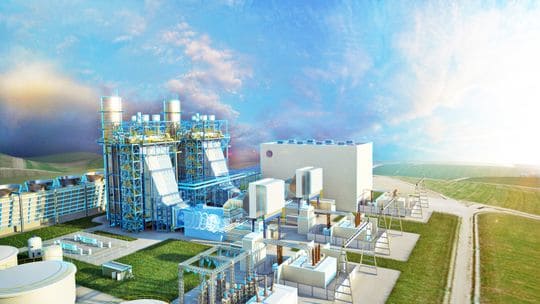
DTE Energy CEO Gerry Anderson announced a more aggressive schedule Thursday for the Detroit-based power company to reduce its carbon output and rely more on renewable energy sources including wind and solar.
“In Michigan, we are in the midst of a fundamental energy transformation,” Anderson told reporters.
Among other points, Anderson told reporters at DTE’s headquarters in Detroit:
- DTE is accelerating the retirement of its remaining coal-fired plants, which put more carbon into the atmosphere than any other power source. It will close its Trenton and St. Clair plants by 2022, a year ahead of schedule, and remove all coal from its generation network by 2040.
- Wind, solar, and other renewable energy sources should make up 25 to 30 percent of DTE’s power mix by 2030. The company will invest $2 billion in renewable sources by 2024.
- DTE is on track to reduce its total carbon output from its peak levels by 50 percent by 2030 and by 80 percent by 2040, about 10 years sooner than previously planned.
- While renewable sources are increasingly important, a large part of the reduction in carbon emissions will come from switching away from coal and into natural gas, a cleaner fuel. DTE’s new Blue Water Energy Center in St. Clair County, set to come online around 2022, will show about a 70 percent reduction in emissions compared to an older coal-fired plant.
The company also hopes to increase energy efficiency by about 1.75 percent a year, which in turn will reduce carbon emissions.
The good news for consumers: Anderson said the average user at home should see no change in price or reliability of electricity because of the evolving mix of fuel sources for power plants.
The changes Anderson announced reflect both the evolving economics of the power industry and the need to clean up power generation to lessen the impact of global warming. Climate scientists agree that the rise in global temperatures has been caused by human activities since the beginning of the industrial revolution more than 200 years ago.
Reporters asked Anderson whether DTE’s steps were sufficient given the need to lessen the damage from global warming.
“It certainly matches what scientists have been asking of our sector,” he said. “I often say to people the job of reducing carbon is a huge task for our economy. It’s not a game of purity. It’s a game of pace and progress. We need to take practical solutions at scale and make them happen.”
As to whether DTE could stop using coal even sooner, he said, “It is impractical to think that we’re simply going to shut down what’s still a very significant contributor to our energy economy cold turkey. We simply don’t have the resources to back-fill it that quickly.
“But we can steadily shut it down over time and replace it with things that are far lower producing. Do I think we can get to sharp reductions in carbon in what isn’t that long a period? Yes, I think we can contribute what we need to.”
One potentially challenging change is coming soon: The growing use of electric vehicles will mean increased demand for power generation for recharging stations.
That is one reason it’s difficult to predict the mix of fuel sources and pricing more than about 10 years out. Today, natural gas is abundant and affordable and wind and solar power are cheaper than before, but that may not have been predictable a couple of decades ago.
DTE’s plan to shut down its Trenton coal-fired plant drew a response Thursday from U.S. Rep. Debbie Dingell, D-Mich.:
“Transitioning to a clean energy future will make our communities healthier places to live and make them more sustainable going forward. But transitions are never easy. In this case, Trenton relies on the tax base from the plant and we must ensure that communities have the resources they need to provide for an increased quality of life for their residents.”
